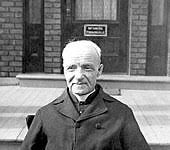Much of the pleasure in writing about John Henry Newman comes from the opportunity to quote his exquisite prose. Consider this statement from a sermon he preached as a young cleric in 1826:
. . . men often regard Christianity as a slavish system which is prejudicial to the freedom of thought, the aspirations of genius, and the speculations of enterprise; an unnatural system which sets out with supposing the human mind is out of order, and consequently bends all its efforts to overthrow the constitution of feeling and belief with which man is born, and to make him a being for which nature never intended him; and a pernicious system, which unfits men for this life by fixing their thoughts on another, and which, wherever consistently acted upon, infallibly leads (as it often has led) to the encouragement of the monastic spirit and the extravagances of fanaticism.[1]
One could find many such passages, in which a concept is examined from multiple angles. His reason for this approach is simply that a large reality cannot be captured by a slogan or in a few words; it has to be tossed into the air, as it were, letting the light glance off its many facets in order for the observer to come to some understanding of its complexity. In his own words:
Truth is vast and far-stretching, viewed as a system; and, viewed in its separate doctrines, it depends on the combination of a number of various, delicate, and scattered evidences; hence it can scarcely be exhibited in a given number of sentences. If this be attempted, its advocate, unable to exhibit more than a fragment of the whole, must round off its rugged extremities, and unite its straggling lines, by much the same process by which an historical narrative is converted into a tale.[2]
Newman was steeped in sacred Scripture, and this characteristic of his thinking would have come from the discovery that the Bible was equally subtle in its presentation of the truths of faith. Think for a moment of the extended description of love in 1 Corinthians 13: “Love is patient and kind; love is not jealous or boastful; it is not arrogant or rude. . . .” Or in Galatians, chapter 5, with its listing of fifteen vices and nine virtues. The reader cannot but be convinced of the evil of wrongdoing when the cumulative horror of those nineteen strikes home—“fornication, impurity, licentiousness, idolatry, sorcery, enmity, strife, jealousy, anger, selfishness, dissension, party spirit, envy, drunkenness, carousing”—or of the attraction of virtue in the cumulative beauty of the nine—“love, joy, peace, patience, kindness, goodness, faithfulness, gentleness, self-control.”[3] Our attention today, however, is directed to another list, that found in today’s second reading from the Letter to the Philippians:
Whatever is true, whatever is honourable, whatever is just, whatever is pure, whatever is pleasing, whatever is commendable, if there is any excellence and if there is anything worthy of praise, think about these things.[4]
We are called to “think about these things,” and we may begin by consulting Saint Jerome. In one of his letters[5] he described his approach to translation. Most of the time, he said that he translates freely, not word for word but expressing in a new language the sense of the original, . . . except in the case of sacred Scripture, where the very order of the words is significant. Was he correct? We can test his principle by noting the order as well the meaning of those eight attributes of virtue listed by Saint Paul: “true, honourable, just, pure, pleasing, commendable, excellent, worthy of praise.”
We see immediately that the first—“true”—is a logical starting point, for knowledge about something, anything, is a prerequisite for forming an opinion and acting upon it; and, naturally, it cannot be false if that action is to be worthwhile. Once the truth is accepted, out behaviour will be honourable insofar as it “honours” that truth. But what makes an act honourable? The answer to that question is the third item in Saint Paul’s list: it will be honourable if it is “just.” If follows that the person who is just, that is to say, who fulfils his obligations to God and to his neighbour, will have purity, in the sense that neither his mind nor relationships will be tainted by anything cruel or self-seeking. The recognition of this attribute is “pleasing” to everyone who witnesses it, and, as pleasing, will be praiseworthy, or “commendable.” The person who practises these virtues will certainly become skilled in them, i.e., “excellent,” and as excellent “worthy or praise.” And thus, we see that Saint Jerome was right: “the very order of the words is significant.”
We could go through the list a second time and demonstrate that each item witnesses to the action on the soul of the Holy Spirit that Jesus promised would guide the thoughts and actions of his followers, and whom we receive especially at Baptism and Confirmation. Equally, we may examine the behaviour of the vineyard workers in the Gospel to exhibit their betrayal of every virtue in Saint Paul’s list. For they are false, not true, and selfish, not honourable, in refusing their duty to the owner. They further their dishonourable behaviour is unjust in their brutal treatment of the owner’s slaves and the murder of his son. Such are the consequences of an impure, corrupted and self-seeking conscience, which is ugly, not pleasing, and certainly not commendable. The descent of their will to evil exhibits a cunning sort of skill, but one that can hardly be characterized as “excellent.” It is worthy, not of praise, but of condemnation: “Depart from me, you cursed, into the eternal fire.”[6]
[1] John Henry Newman, “The Philosophical Temper, First Enjoined by the Gospel,” Fifteen Sermons Preached before the University of Oxford (London: Longmans, Green, and Co., 1896), p. 14.
[2] John Henry Newman, “Personal Influence, the Means of Propagating the Truth,” Fifteen Sermons Preached before the University of Oxford (London: Longmans, Green, and Co., 1896), p. 90.
[3] Gal 5.19-23.
[4] Phil 4.8.
[5] Letter 57.5.
[6] Matt 25.41.










